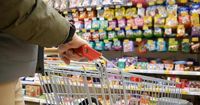England has ushered in a new era in its fight against obesity, as sweeping restrictions on supermarket deals for unhealthy foods take effect from October 1, 2025. The ban, which outlaws popular price and multibuy promotions such as "buy one, get one free" on snacks and sugary drinks, applies to supermarkets, larger high street shops, and online retailers. Restaurants and cafes are also caught in the net, with free refill promotions of fizzy drinks now prohibited.
This long-anticipated move is part of the government’s broader crackdown on the country’s rising obesity rates—especially among children. The measure, first announced back in 2021 by then-Prime Minister Boris Johnson, faced repeated delays due to the cost-of-living crisis, which ministers cited as a reason to give the food industry more time to adapt. But as of today, the rules are in force, marking a significant step in public health policy.
The new regulations are underpinned by a government classification system that defines which foods and drinks are considered unhealthy. The list is extensive: it includes sugary soft drinks like lemonade and cola, as well as crisps, sweets, chocolates, ice creams, pastries, cakes, and even some fishfingers and pizzas. The rationale? These items are viewed as having the greatest influence on childhood obesity, a problem that has reached worrying proportions in recent decades.
According to the Department of Health and Social Care, "Obesity robs children of the best possible start in life, sets them up for a lifetime of health problems and costs the NHS billions." The department’s spokesman stressed that the restrictions are a "crucial step" in giving children a healthy, happy start in life. The statistics are sobering: more than a quarter of adults and a fifth of children finishing primary school are now classed as obese—a trend that has escalated sharply over the years.
The government’s plan doesn’t stop here. From January 2026, a ban on television advertising of less healthy food and drink before 9pm will come into force, along with a complete ban on online promotions. The hope is that these combined measures will help stem the tide of obesity and its associated costs to the nation’s health and economy.
Greg Fell, president of the Association of Public Health Directors, has been a vocal supporter of the move, though he’s quick to point out its limitations. He called the ban "long overdue," noting, "Multi-buy promotions do not save people money—in fact, they encourage them to spend more. They are designed to encourage impulsive purchases and to normalise buying more and more frequently." Fell also emphasized that obesity has become a "key driver" of health inequalities, with those in more deprived areas nearly twice as likely to be obese.
He added, "These are a long-overdue first step, but the government is far away from meeting its manifesto commitment to end junk food advertising to kids." Fell and other campaigners argue that further action is needed, including tighter restrictions on junk food sponsorship of sporting events, greater investment in active travel infrastructure, and improvements to the quality of food served in schools.
Evidence suggests that such restrictions can have a measurable impact. A University of Leeds study, published earlier this year, examined the effects of a 2022 ban on selling unhealthy products at key locations in stores—think checkouts, aisle ends, and store entrances. Before the ban, 20 out of every 100 items sold were classified as unhealthy; after the ban, that number dropped to 19, which equates to two million fewer unhealthy products sold each day. While researchers acknowledged that sales of these items were already on a downward trend before the legislation and that inflation may have played a role, the reduction is nonetheless significant.
The retail sector, for the most part, appears to have taken the new rules in stride. Some major chains, including Tesco and Sainsbury’s, had already introduced their own restrictions ahead of the government mandate. Andrea Martinez-Inchausti, from the British Retail Consortium, said, "Most of our members are already compliant. Retailers are helping customers make healthier choices through better calorie labelling, reformulation of products, and portion control." She added, "There will not be a big change for them."
Despite some industry lobbying against the restrictions in previous years, the overall response from retailers has been largely cooperative. The sector’s willingness to adapt may have been influenced by public health data and the growing consensus that urgent action is needed to address obesity. After all, the costs to the NHS and the wider economy are mounting, and the impact on children’s futures is a pressing concern for policymakers and parents alike.
The new measures are not unique to England. Wales is set to introduce similar restrictions in 2026, and Scotland has committed to follow suit. This signals a broader UK-wide shift in public health strategy, with governments across the country recognizing the need for coordinated action to tackle obesity.
The journey to this point has not been straightforward. The policy was first announced as part of a UK-wide strategy in 2021, but ministers repeatedly postponed its implementation, blaming the cost-of-living crisis and the need to give the food industry time to prepare. Critics, however, have argued that the delays have come at a cost, as obesity rates have continued to climb and the health gap between rich and poor has widened.
Looking ahead, campaigners are urging the government to go further. They want to see a tightening of restrictions on junk food advertising, particularly in sports and leisure events, as well as more investment in initiatives that encourage physical activity and healthier eating habits. As Greg Fell put it, "The government is still a long way from meeting its pledge to protect children from junk food advertising."
For now, though, the ban on "buy one, get one free" deals and similar promotions marks a significant milestone in England’s battle against obesity. Whether it will be enough to reverse the tide remains to be seen, but it’s a clear signal that the government is ready to take bold steps—however belatedly—to safeguard the nation’s health.
As the new rules bed in, all eyes will be on their real-world impact, and whether they can help nudge consumers toward healthier choices in a landscape long shaped by the lure of cheap, convenient, and calorie-laden foods.





